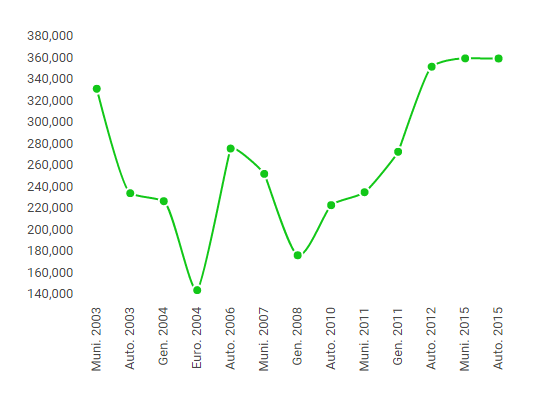Initiative for Catalonia Greens - Esquerra Unida i Alternativa
Iniciativa per Catalunya Verds-Esquerra Unida i Alternativa (ICV-EUiA) was a left-wing and environmental electoral coalition, created in 2003 to contest the elections in Catalonia by Iniciativa per Catalunya Verds (ICV) and Esquerra Unida i Alternativa (EUiA). Apart from these two main members, it also had the support of other groups such as Equo Catalunya, Entesa pel Progrés Municipal (EPM) and, until 2007, the environmentalist party Els Verds-Esquerra Ecologista.
The agreement was also extended to the elections to the European Parliament, and although it was terminated when Raül Romeva, ICV MEP, skipped the agreement to join the European Left/Nordic Green Left group and joined the Group of The Greens / European Free Alliance, in the following elections it was reissued again.
On October 5, 2011, ICV and EUiA decided to opt for a "technical coalition" according to which the deputies of the coalition would have the possibility of joining the IU parliamentary group or another, if they so decided, an option that would allow ICV to join its referent Equo, something that did not happen as the latter did not obtain sufficient representation training to form a parliamentary group.
Institutional representation
Congress of Deputies
In the 2004 general elections, the coalition obtained 234,790 votes (5.84%) in the Catalan constituencies, which resulted in the seats of Joan Herrera and Carme García, both from ICV and from Barcelona. EUiA had number three for Barcelona, but did not win a seat. The coalition had an agreement with Izquierda Unida for Congress, so both deputies joined the three from IU in the Izquierda Verde parliamentary group. During the 2004-2008 legislature, Herrera was co-spokesperson for the group along with Gaspar Llamazares.
In the 2008 elections they lost more than 50,000 votes, leaving only one seat, held until September 2010 by Joan Herrera, who would later be replaced by Núria Buenaventura
In the 2011 elections, the ICV-EUiA candidacy won almost 100,000 votes compared to 2008 and surpassing Esquerra Republicana de Catalunya. He obtained three tallies, those of Joan Coscubiela and Laia Ortiz (ICV) and Joan Josep Nuet (EUiA), all for Barcelona.
Senate
In the Senate elections, the coalition was part of the candidacy of the Entesa Catalana de Progrés together with the PSC and ERC. In the 2008 elections, Entesa obtained the twelve senators at stake for the majority list in Catalonia, one corresponding to ICV. Another senator, Joan Josep Nuet, from EUiA, was elected to represent the Parliament of Catalonia in 2006 (replacing an ICV senator). The alliance was presumed dead after the 2011 Municipal Elections.
Parliament of Catalonia
The 2003 regional elections were the first time that the ICV-EUiA coalition stood for parliamentary elections, at that time under the name Iniciativa per Catalunya Verds - Esquerra Alternativa. It obtained 9 deputies, 8 from ICV and 1 from EUiA.
In the 2006 regional elections ICV-EUiA obtained 12 deputies, a result only surpassed so far by the Unified Socialist Party of Catalonia (PSUC), a Catalan leader of the PCE, in the regional elections of 1980 with 25 deputies. Of the 12 deputies, 10 corresponded to the ICV quota and 2 to the EUiA quota
However, this increase produced in 2006 stalled in the regional elections of 2010, when ICV-EUiA lost 2 seats, obtaining ten acts of deputy (8 for ICV and 2 for EUiA). That fall continued in the 2011 municipal elections, in which the coalition lost 16,260 votes and 398 councillors.
In the 2012 regional elections, ICV-EUiA rose to 13 deputies, with 10 for ICV and 3 for EUiA.
Government of Catalonia
The coalition was part of the tripartite government together with the PSC-PSOE and ERC, both in the government of Pasqual Maragall (2003-2006), and that of José Montilla (2006-2010). In the first government, they directed the Ministry of Institutional Relations and Participation (led by Joan Saura from ICV) and the Ministry of Environment and Housing (first led by Salvador Milà and then Francesc Baltasar, both from ICV). In the second government, Joan Saura headed the Ministry of the Interior, Institutional Relations and Participation and Francesc Baltasar maintained the Ministry of the Environment and Housing.
Catalan municipalities
ICV-EUiA had the municipal vote concentrated in the metropolitan area of Barcelona, thus inheriting the legacy of the PSUC. Its influence was concentrated in El Prat de Llobregat, Molins de Rey and Sant Feliu de Llobregat, but also in Sardañola del Vallés, Pallejá, Montornés del Vallés, San Adrián de Besós, Altafulla, Martorellas, Hospitalet de Llobregat, Badalona, Moncada and Reixach and Santa Coloma de Gramanet.
Election results
Results of the ICV-EUiA coalition
Elections to the Parliament of Catalonia
| Year | Candidate | Votes | % of votes | Scalls | Position | Notes |
|---|---|---|---|---|---|---|
| 2003 | Joan Saura | 241.163 | 7.28 % | 6 | 5o | 3 for Initiative per Catalunya Verds (ICV), 1 for United and Alternative Esquerra (EUiA) and 2 independent. |
| 2006 | Joan Saura | 281.474 | 9.56 % | 9 | 5o | 6 for Initiative per Catalunya Verds (ICV), 2 for United and Alternative Esquerra (EUiA) and 1 independent. |
| 2010 | Joan Herrera | 229.985 | 7.39 % | 8 | 4o | 6 for Initiative per Catalunya Verds (ICV) and 2 for United and Alternative Esquerra (EUiA). |
| 2012 | Joan Herrera | 359.705 | 9.89% | 13 | 5o | 10 for Initiative per Catalunya Verds (ICV), which included Equo Catalunya, and 3 for the United and Alternative Esquerra (EUiA). |
In view of the elections to the Parliament of Catalonia in 2015, the ICV-EUiA coalition was not reissued, but both forces joined the Catalunya Sí que es Pot coalition together with Podemos, Equo Catalunya and independents, which obtained 11 deputies and 367,613 votes (8.94%).
Contenido relacionado
New Sparta State
European Parliament
Government of Nuevo Leon
